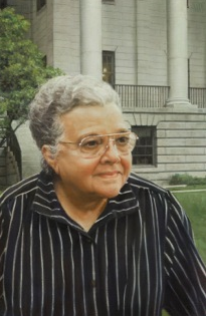Black History, Science
 Dr. Frances J. Bonner, (1919-2000) was born in Saint Louis, and grew up in Greensboro, North Carolina, where her father David D. Jones was president of Bennett College, an institution devoted to the education of young Afro-American women.
Dr. Frances J. Bonner, (1919-2000) was born in Saint Louis, and grew up in Greensboro, North Carolina, where her father David D. Jones was president of Bennett College, an institution devoted to the education of young Afro-American women.
While a freshman at Bennett College, she led a successful protest and boycott of the local movie theaters in Greensboro North Carolina. (The theaters in North and South Carolina would not show movies where Whites and Afro-Americans were depicted as equals.) After months of picketing their efforts were successful, leading the Carolina Times to conclude that “the step taken by the students in the two Negro schools in Greensboro shows more courage on the part of Negro youth than we have any record of anywhere else in the south.” (more…)
Black History, Civil Rights

Angela Davis
(b. Jan. 26, 1944, Birmingham, Ala., U.S.), militant American black activist who gained an international reputation during her imprisonment and trial on conspiracy charges in 1970-72. The daughter of Alabama schoolteachers, Angela Davis studied at home and abroad (1961-67) before becoming a doctoral candidate at the University of California, San Diego, under the Marxist professor Herbert Marcuse.
Because of her political opinions and despite an excellent record as an instructor at the university’s Los Angeles campus, the California Board of Regents in 1970 refused to renew her appointment as lecturer in philosophy. (more…)
Black History, Literature
 Chief of the Chicago Defender’s Washington Bureau, in 1947 Spraggs was initiated into Theta Sigma Phi, the national professional and honorary fraternity for women in journalism, the first black member in the 37-year history of the organization.
Chief of the Chicago Defender’s Washington Bureau, in 1947 Spraggs was initiated into Theta Sigma Phi, the national professional and honorary fraternity for women in journalism, the first black member in the 37-year history of the organization.
Black History, Medicine

Louis T. Wright
1891-1952. A physician and surgeon, Dr. Louis T. Wright originated a method of operating on fractures about the knee joint, a brace for fractures of the spine, and a vaccination against smallpox, and supervised the first test of a miracle drug(aureomycin) on humans. He also advanced a new theory on the treatment of skull fractures and engaged in early cancer research.
Graduating with highest honors from the Harvard Medical School in 1915, he was commissioned a 1st Lieutenant in the Medical Section of the Officers Reserve Corps in 1917, and rose to the rank of Lieutenant Colonel in the U.S. Army during World War I. In 191, he became the first African American to be appointed to a New York City Municipal Hospital(Harlem Hospital) where he helped lower the death rate and increase the professional standards.
Black History, Law

Charlotte Ray was the first African American female lawyer in the United States
Born on January 13, 1850, in New York City. In 1872, Charlotte E. Ray became the first female African-American lawyer in the United States. She grew up in a large family as one of seven children. Her father, Charles, was a minister and an activist in the abolitionist movement.Ray attended the Institution for the Education of Colored Youth in Washington, D.C., during the early 1860s. The institution was one of only a handful of places that offered a quality education to young, African-American women. By the end of the 1860s, she had become a teacher at the preparatory school associated with Howard University. Ray then applied to the university’s law degree program using only her initials, C. E., to disguise her gender. The trick worked, and Ray gained admittance to the program. She excelled at her studies at the university, especially in corporate law. (more…)
 Dr. Frances J. Bonner, (1919-2000) was born in Saint Louis, and grew up in Greensboro, North Carolina, where her father David D. Jones was president of Bennett College, an institution devoted to the education of young Afro-American women.
Dr. Frances J. Bonner, (1919-2000) was born in Saint Louis, and grew up in Greensboro, North Carolina, where her father David D. Jones was president of Bennett College, an institution devoted to the education of young Afro-American women.
 Chief of the Chicago Defender’s Washington Bureau, in 1947 Spraggs was initiated into Theta Sigma Phi, the national professional and honorary fraternity for women in journalism, the first black member in the 37-year history of the organization.
Chief of the Chicago Defender’s Washington Bureau, in 1947 Spraggs was initiated into Theta Sigma Phi, the national professional and honorary fraternity for women in journalism, the first black member in the 37-year history of the organization.
